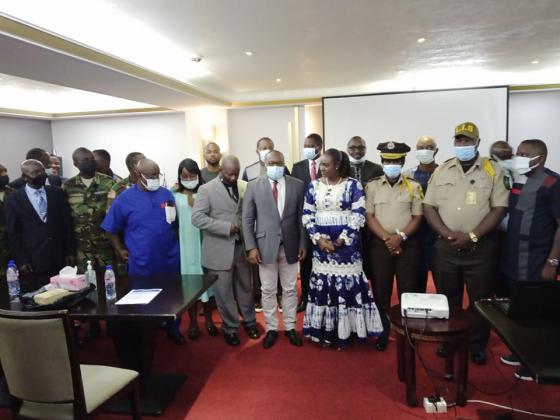Liberia Commits to Ending Illegal Fishing

Participants of the regional fisheries meeting taking place in Monrovia.
The government of Liberia has committed itself to ending illegal fishing in the country’s territorial waters through the ratification of international fisheries agreements, following the end of a two-day technical regional fisheries conference held in Monrovia.
Illegal fishing has remained a serious challenge not only for Liberia, but other countries within the subregion.
Speaking Wednesday, September 22, 2021, during the end of the fisheries meeting, the Director-General of the National Fisheries and Aquaculture Authority (NaFAA), Emma Metieh Glassco, stated that line ministries and agencies of Liberia have resolved to strengthen their collaboration to realize the ratification of both International Labour Organization (ILO) C188 Work in Fishing Convention and the IMO Cape Town Agreement for the safety of fishing vessels by the Government.
Madame Glassco reiterated Liberia’s commitment to the effective implementation of the FAO Port State Measure Agreement through continued work to align legal, institutional and operational frameworks with the requirements of the agreement.
Madam Glassco also mentioned that Liberia has committed to adopting a coordinated approach to the implementation of port controls, including the collaboration of, and information exchange between all relevant agencies and administrations.
She explained that this would be made possible through the establishment of a dedicated task force to ensure that ports represent an effective front in combating IUU fishing, while contributing to improved safety and health in the fisheries sector and labour conditions on board fishing vessels.
Meanwhile the National Fisheries boss has declared her institution’s intention to prevent, deter and eliminate IUU fishing by adopting appropriate measures and taking enforcement action at the national level, in line with the provisions of various fisheries instruments that would encourage member States to take coordinated actions effectively and to ratify the implementation of the three treaties to enhance regional cooperation.
The Liberian Fisheries expert used the occasion to express gratitude to the facilitators and speakers for the exchange of best practices or experiences of expert knowledge provided to the Participants that can help to end illegal fishing in the country.
Also speaking, the secretary general of Fisheries Committee for the West Central Gulf of Guinea (FCWC), Seraphin DEDI, said that the problems and challenges that migrating fish create in the region are multi-sectoral and trans-boundary in character and therefore need concerted efforts of all stakeholders in the sub region to tackle them.
According to him, the West African region has a high incidence of Illegal, Unreported and Unregulated (IUU) fishing and its associated trade in illicit drugs.
“Foreign vessels are not only poaching our fish but also using our waters as transit routes for their trade in hard drugs, slavery and human abuse,” he said.
He stated that FCWC is established to bring together member states, join their efforts to partners to participate actively in sustainable fisheries management in the region with key action in combating IUU fishing and associated crimes.
“This workshop aims to inform participants on the international instruments that strengthen maritime governance at regional and national levels,” he said.
He made specific reference to the Food and Agriculture Organization’s (FAO) Agreement on Port State Measures to Prevent, Deter and Eliminate Illegal, Unreported and Unregulated fishing (the Port State Measures Agreement, or PSMA) and the International Maritime Organization’s Cape Town Agreement (CTA).
According to him, these international instruments, along with the International Labour Organization’s Work in Fishing Convention No. 188 (C188), all include requirements related to port inspections and their harmonized application that ensure that ports represent an effective front in combating IUU fishing, to improve safety and health in the fisheries sector and labour conditions onboard fishing vessels.
“Knowing that in most states, responsibility for the implementation of the various instruments is split across multiple agencies that can include Agriculture, Maritime, Transport and Labour Ministries.
Mr. Dedi added that there is a need for Customs, Navy and the Coastguard harmonized port State control and effective interagency cooperation.
Meanwhile, he used the occasion to urge the participants to remain committed to address the common challenges in the fisheries industry.
“It is my fervent hope and expectation that at the end of this session we will come out with a strong Liberian declaration to ratify the CTA and C188, as well as agree on steps to be taken to achieve this goal,” he concluded.
The two-day fisheries workshop was jointly organized with the Fisheries Committee for the West Central Gulf of Guinea (FCWC) and NaFAA, and brought together government Agencies on Fisheries, Maritime and the Environment, and regional and international Partners. The workshop began on Tuesday September 21, 2021 at a resort in Monrovia.
